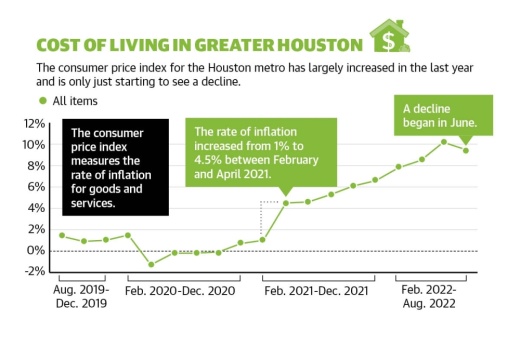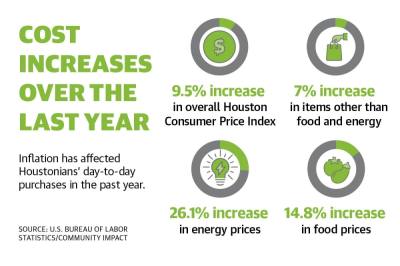Cost-of-living adjustments are set based on increases in the consumer price index, or CPI, which is calculated on a monthly basis by the U.S. Bureau of Labor Statistics. Officials use this CPI data as a baseline to gauge inflation throughout the year and provide a percent increase in benefits for retirees to approximately match inflation, according to the Social Security Administration. Juan Munoz, a Houston-based financial planner for Life Strategy Financial, explained what Social Security beneficiaries can expect from the cost-of-living increase.
“They’re going to get a little bit more on their Social Security benefits, so that’s going to be deposited in their bank account,” Munoz said. “So that’s obviously going to help them. What I would recommend is, instead of grabbing the little extra money and spending it, just consider saving it because we don’t know how long this inflation is going to last.”
The increase in benefits is necessary for local retirees, Munoz said, as Cy-Fair residents have felt inflation hit their pocketbooks with recent rises in grocery, gas, electricity and rent prices.
According to the BLS, the CPI in Houston saw a 9.5% increase overall in the last 12 months. Included in this is a 26.1% increase in energy costs and a 14.8% increase in food prices. The main contributors to prices outside of food and energy were owner’s equivalent rent prices, vehicle maintenance, repair and rent of primary residences.
While prices have risen across most categories in Houston, it remains the second-most affordable large metro in the nation, behind St. Louis, according to data from the Council for Community and Economic Research.
Lauren McCardell, director of marketing and communications with Cypress Assistance Ministries, said the increase in benefits will help older residents struggling to make ends meet. The organization serves low-income families in the area through services, such as a food pantry, educational resources, and a resale store offering clothing and household items.
“To be honest, there needed to be an increase because we have had a severe increase in elders and seniors that aren’t able to afford living and paying rent in their living facilities,” McCardell said. “A lot of times they use their Social Security to pay their bills, to make their everyday purchases, and there has been an ultimate increase in rent [as well as] groceries, medical supplies and things like that.”
CAM officials project seniors will continue to need assistance with purchasing necessities in 2023 as prices are expected to remain high.
Munoz also said he believes while prices may drop slightly, they will not go back to what they once were prior to the pandemic.
“The Federal Reserve is trying to lower the inflation. They’re being very aggressive,” he said. “What we’re seeing and the economists are talking about is that it will go down but not as dramatic as we would like it to. So it may go down a couple points, maybe up to like half the inflation by next year, but that’s being very optimistic. I think inflation is going to be here for the remainder of the year and at least the first half of 2023.”
CAM has programs in place to support seniors who fall behind on certain bills or cannot afford necessities, such as food, medical supplies and other personal care items. McCardell said the need for these services will likely not decline within the next year.
Munoz agreed while the 8.7% increase in benefits will certainly be helpful to seniors, they will still need help with bills and necessities.
“It’s never enough to be honest with you,” Munoz said. “I think it’s good enough for what’s currently happening, and it’s better than a lot of pensions, and a lot of retirement plans are not adjusting. So when it comes to the adjustment of the benefit of Social Security, I think it’s great, and it’s much better than what you can get in other places.”






